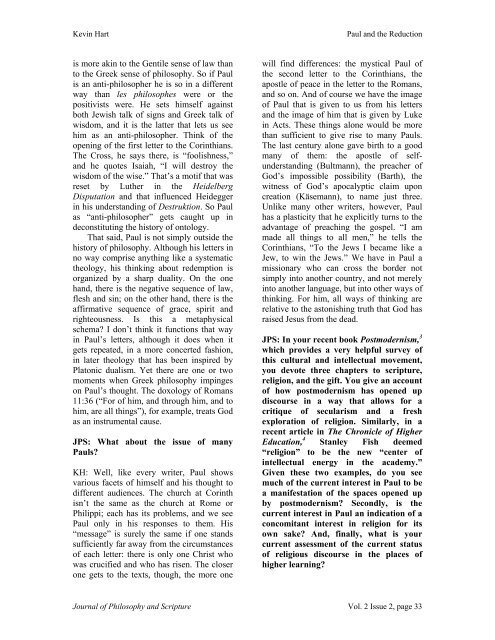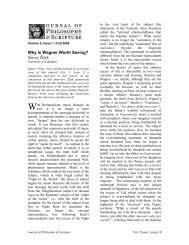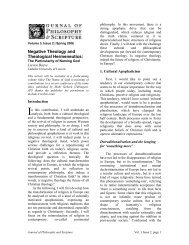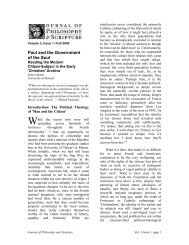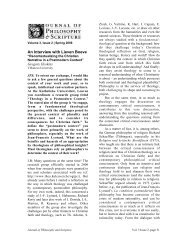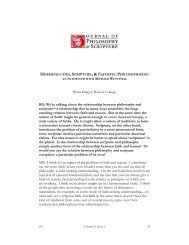An Interview with Kevin Hart - Journal of Philosophy and Scripture
An Interview with Kevin Hart - Journal of Philosophy and Scripture
An Interview with Kevin Hart - Journal of Philosophy and Scripture
Create successful ePaper yourself
Turn your PDF publications into a flip-book with our unique Google optimized e-Paper software.
<strong>Kevin</strong> <strong>Hart</strong><br />
Paul <strong>and</strong> the Reduction<br />
is more akin to the Gentile sense <strong>of</strong> law than<br />
to the Greek sense <strong>of</strong> philosophy. So if Paul<br />
is an anti-philosopher he is so in a different<br />
way than les philosophes were or the<br />
positivists were. He sets himself against<br />
both Jewish talk <strong>of</strong> signs <strong>and</strong> Greek talk <strong>of</strong><br />
wisdom, <strong>and</strong> it is the latter that lets us see<br />
him as an anti-philosopher. Think <strong>of</strong> the<br />
opening <strong>of</strong> the first letter to the Corinthians.<br />
The Cross, he says there, is “foolishness,”<br />
<strong>and</strong> he quotes Isaiah, “I will destroy the<br />
wisdom <strong>of</strong> the wise.” That’s a motif that was<br />
reset by Luther in the Heidelberg<br />
Disputation <strong>and</strong> that influenced Heidegger<br />
in his underst<strong>and</strong>ing <strong>of</strong> Destruktion. So Paul<br />
as “anti-philosopher” gets caught up in<br />
deconstituting the history <strong>of</strong> ontology.<br />
That said, Paul is not simply outside the<br />
history <strong>of</strong> philosophy. Although his letters in<br />
no way comprise anything like a systematic<br />
theology, his thinking about redemption is<br />
organized by a sharp duality. On the one<br />
h<strong>and</strong>, there is the negative sequence <strong>of</strong> law,<br />
flesh <strong>and</strong> sin; on the other h<strong>and</strong>, there is the<br />
affirmative sequence <strong>of</strong> grace, spirit <strong>and</strong><br />
righteousness. Is this a metaphysical<br />
schema? I don’t think it functions that way<br />
in Paul’s letters, although it does when it<br />
gets repeated, in a more concerted fashion,<br />
in later theology that has been inspired by<br />
Platonic dualism. Yet there are one or two<br />
moments when Greek philosophy impinges<br />
on Paul’s thought. The doxology <strong>of</strong> Romans<br />
11:36 (“For <strong>of</strong> him, <strong>and</strong> through him, <strong>and</strong> to<br />
him, are all things”), for example, treats God<br />
as an instrumental cause.<br />
JPS: What about the issue <strong>of</strong> many<br />
Pauls?<br />
KH: Well, like every writer, Paul shows<br />
various facets <strong>of</strong> himself <strong>and</strong> his thought to<br />
different audiences. The church at Corinth<br />
isn’t the same as the church at Rome or<br />
Philippi; each has its problems, <strong>and</strong> we see<br />
Paul only in his responses to them. His<br />
“message” is surely the same if one st<strong>and</strong>s<br />
sufficiently far away from the circumstances<br />
<strong>of</strong> each letter: there is only one Christ who<br />
was crucified <strong>and</strong> who has risen. The closer<br />
one gets to the texts, though, the more one<br />
will find differences: the mystical Paul <strong>of</strong><br />
the second letter to the Corinthians, the<br />
apostle <strong>of</strong> peace in the letter to the Romans,<br />
<strong>and</strong> so on. <strong>An</strong>d <strong>of</strong> course we have the image<br />
<strong>of</strong> Paul that is given to us from his letters<br />
<strong>and</strong> the image <strong>of</strong> him that is given by Luke<br />
in Acts. These things alone would be more<br />
than sufficient to give rise to many Pauls.<br />
The last century alone gave birth to a good<br />
many <strong>of</strong> them: the apostle <strong>of</strong> selfunderst<strong>and</strong>ing<br />
(Bultmann), the preacher <strong>of</strong><br />
God’s impossible possibility (Barth), the<br />
witness <strong>of</strong> God’s apocalyptic claim upon<br />
creation (Käsemann), to name just three.<br />
Unlike many other writers, however, Paul<br />
has a plasticity that he explicitly turns to the<br />
advantage <strong>of</strong> preaching the gospel. “I am<br />
made all things to all men,” he tells the<br />
Corinthians, “To the Jews I became like a<br />
Jew, to win the Jews.” We have in Paul a<br />
missionary who can cross the border not<br />
simply into another country, <strong>and</strong> not merely<br />
into another language, but into other ways <strong>of</strong><br />
thinking. For him, all ways <strong>of</strong> thinking are<br />
relative to the astonishing truth that God has<br />
raised Jesus from the dead.<br />
JPS: In your recent book Postmodernism, 3<br />
which provides a very helpful survey <strong>of</strong><br />
this cultural <strong>and</strong> intellectual movement,<br />
you devote three chapters to scripture,<br />
religion, <strong>and</strong> the gift. You give an account<br />
<strong>of</strong> how postmodernism has opened up<br />
discourse in a way that allows for a<br />
critique <strong>of</strong> secularism <strong>and</strong> a fresh<br />
exploration <strong>of</strong> religion. Similarly, in a<br />
recent article in The Chronicle <strong>of</strong> Higher<br />
Education, 4 Stanley Fish deemed<br />
“religion” to be the new “center <strong>of</strong><br />
intellectual energy in the academy.”<br />
Given these two examples, do you see<br />
much <strong>of</strong> the current interest in Paul to be<br />
a manifestation <strong>of</strong> the spaces opened up<br />
by postmodernism? Secondly, is the<br />
current interest in Paul an indication <strong>of</strong> a<br />
concomitant interest in religion for its<br />
own sake? <strong>An</strong>d, finally, what is your<br />
current assessment <strong>of</strong> the current status<br />
<strong>of</strong> religious discourse in the places <strong>of</strong><br />
higher learning?<br />
<strong>Journal</strong> <strong>of</strong> <strong>Philosophy</strong> <strong>and</strong> <strong>Scripture</strong> Vol. 2 Issue 2, page 33


